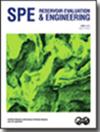碳酸盐岩储层增产用阳离子表面活性剂
IF 1.5
4区 工程技术
Q3 ENERGY & FUELS
引用次数: 2
摘要
本文介绍了由正离子和阴离子表面活性剂组成的阳离子表面活性剂的研制,使其成为高温高矿化度碳酸盐岩油藏化学驱的高性能产品。本研究的目的是通过混合负离子表面活性剂和阳离子表面活性剂(CASs)来优化表面活性剂的化学性质,在给定的恶劣条件下,由于静电吸引,界面性质会产生显著的协同效应,从而提高产油量。根据90℃高盐度盐水中油与表面活性剂的相容性、微乳液相行为以及油与表面活性剂溶液的界面张力(IFT),确定了最佳的表面活性剂混合比例。对阳离子表面活性剂的综合性能进行了评价,包括表面活性剂在碳酸盐岩上的吸附性能和在95℃下的长期稳定性。在95°C的温度下,采用碳酸盐岩心桥塞进行了岩心驱替实验,以评估最佳阳离子表面活性剂提高采收率的潜力。本研究开发了三种相容性良好的阳离子表面活性剂。随着温度的升高,混合表面活性剂之间的协同作用增强。虽然单个表面活性剂与原油的IFT在10−1 ~ 100 mN/m之间,但通过将所选阴离子表面活性剂与CASs混合,观察到IFT显著降低了10−2 ~ 10−3 mN/m。盐度扫描显示,在较宽的盐度范围内,IFT值保持在10−2 mN/m,这证明了阳离子表面活性剂的有效性。在微乳液相行为研究中,制备的阳离子表面活性剂溶液在原油存在下表现为Winsor III型乳液。阳离子表面活性剂的静态吸附量低于单个表面活性剂的静态吸附量。这些都表明了阳离子表面活性剂在恶劣储层条件下应用的可行性。岩心驱替试验结果表明,除水驱外,采收率显著提高。这项工作为在恶劣条件下通过混合带相反电荷的表面活性剂获得高效的表面活性剂配方提供了一条有效途径。本文章由计算机程序翻译,如有差异,请以英文原文为准。
Catanionic Surfactants for Improving Oil Production in Carbonate Reservoirs
This paper presents the development of catanionic surfactants composed of cationic and anionic surfactants to make them high-performance products for chemical flooding in high-temperature and high-salinity carbonate reservoirs. The objective of this study is to optimize the surfactant chemistry by mixing oppositely charged anionic surfactants and cationic surfactants (CASs), which results in significant synergistic effects in interfacial properties due to electrostatic attraction to improve oil production at the given harsh conditions. The optimal mixing surfactant ratios were determined according to the brine-surfactant compatibility, microemulsion phase behavior, and the interfacial tension (IFT) between oil and surfactant solutions in high-salinity brine at 90°C. Comprehensive performance of the catanionic surfactants was evaluated, including adsorption of the surfactants onto the carbonate rocks and the long-term stability at 95°C. The coreflooding displacement experiments were performed using carbonate core plugs at 95°C to evaluate the potential of the optimal catanionic surfactant in improving oil recovery. Three catanionic surfactants with good compatibility were developed in this study. It appeared that the synergistic effect between the mixing surfactants was enhanced with increasing temperature. Although the IFT of the individual surfactants with crude oil was between 10−1 and 100 mN/m, a significant IFT reduction in the magnitude of 10−2 to 10−3 mN/m was observed by mixing the selected anionic surfactants and CASs. A salinity scan showed that the IFT values maintained a value of 10−2 mN/m in a wide salinity range, which demonstrated the effectiveness of the catanionic surfactant. In microemulsion phase behavior studies, the developed catanionic surfactant solution in the presence of crude oil exhibited Winsor Type III emulsions. The static adsorption quantities of the catanionic surfactants were lower than the values of the individual surfactants. All these indicated the feasibility of catanionic surfactants for their applications in the harsh reservoir conditions. The results of coreflooding displacement tests demonstrated significant oil recovery improvement beyond waterflooding. This work provides an efficient way to get surfactant formulations by mixing oppositely charged surfactants to obtain high performance in improving oil production under harsh conditions.
求助全文
通过发布文献求助,成功后即可免费获取论文全文。
去求助
来源期刊
CiteScore
5.30
自引率
0.00%
发文量
68
审稿时长
12 months
期刊介绍:
Covers the application of a wide range of topics, including reservoir characterization, geology and geophysics, core analysis, well logging, well testing, reservoir management, enhanced oil recovery, fluid mechanics, performance prediction, reservoir simulation, digital energy, uncertainty/risk assessment, information management, resource and reserve evaluation, portfolio/asset management, project valuation, and petroleum economics.

 求助内容:
求助内容: 应助结果提醒方式:
应助结果提醒方式:


